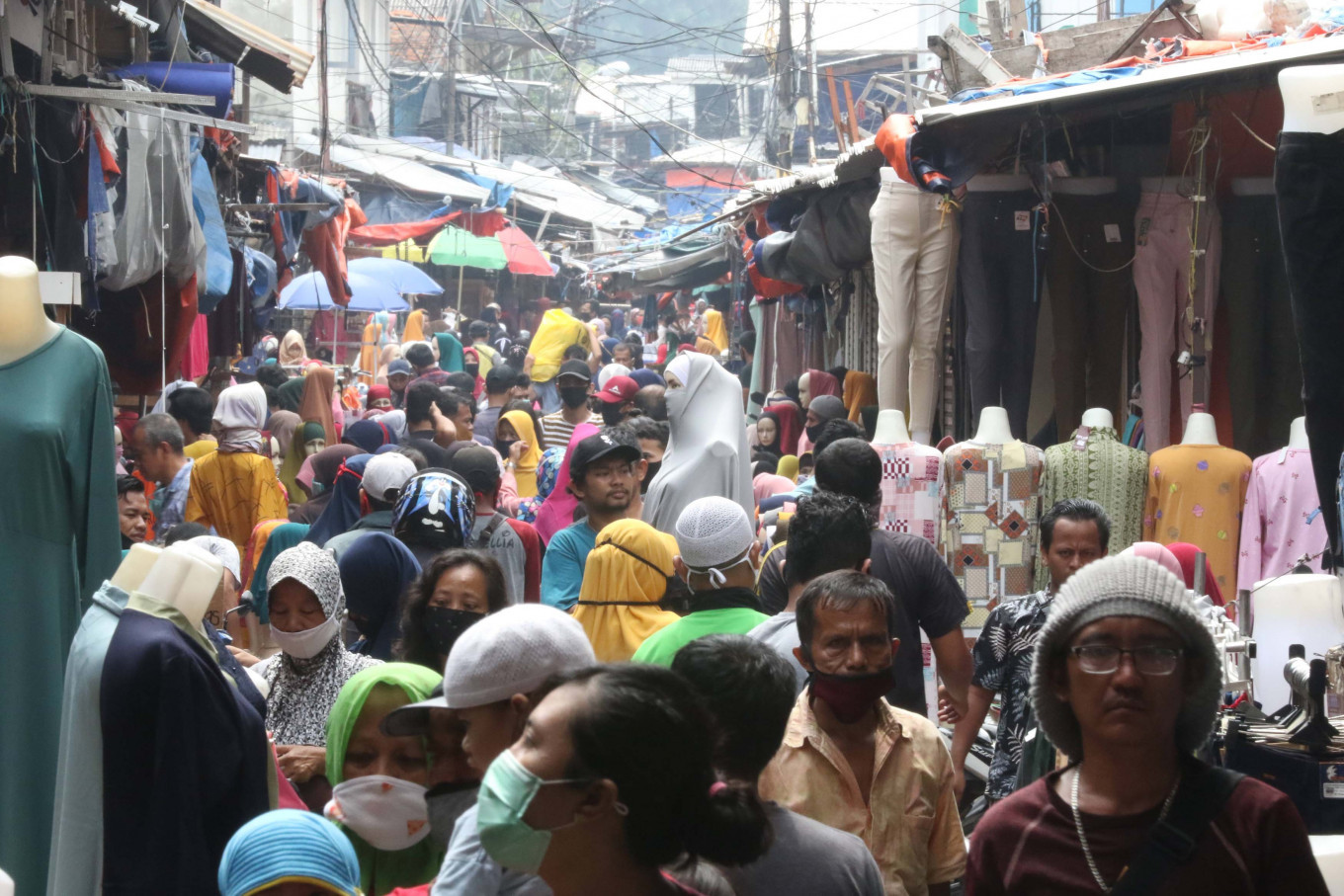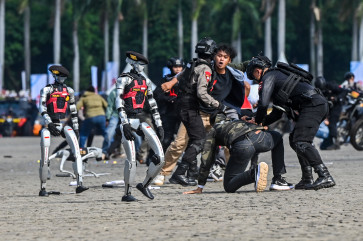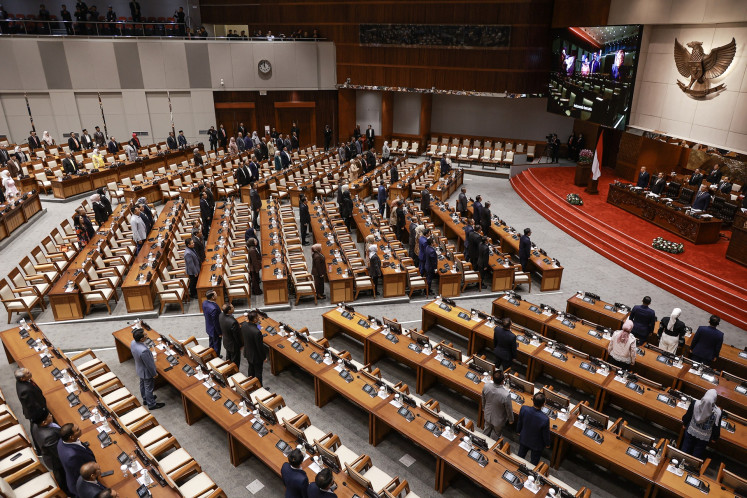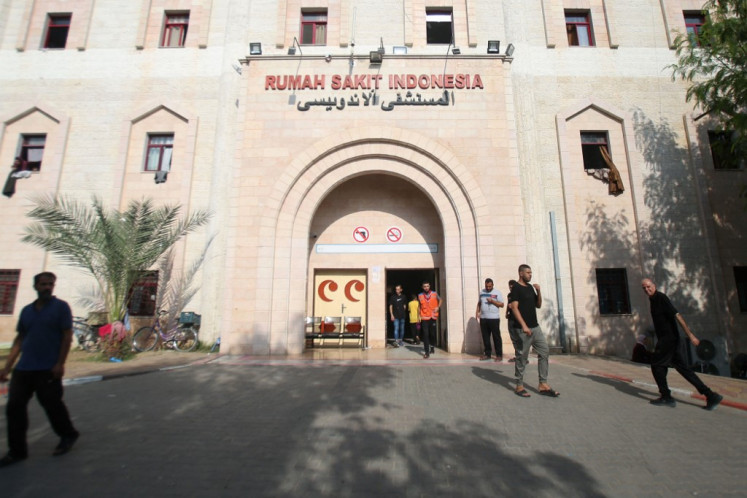Popular Reads
Top Results
Can't find what you're looking for?
View all search resultsPopular Reads
Top Results
Can't find what you're looking for?
View all search resultsGreater Jakarta braces for ‘local’ exodus ahead of Idul Fitri
Many Indonesians have found it difficult to forego the centuries-old practice of extending silaturahmi (communal bonds) during the Idul Fitri holiday, even as the government imposes large-scale social restrictions (PSBB) to curb the spread of COVID-19 across provincial boundaries.
Change text size
Gift Premium Articles
to Anyone
 Restrictions be damned: Jakartans crowd Jl. Jatibaru in Tanah Abang, Central Jakarta, on Monday, May 18, ahead of the Idul Fitri holiday. Vendors say financial pressures have left them with no choice but to keep selling their merchandise despite the city's large-scale social restrictions (PSBB). (JP/Dhoni Setiawan)
Restrictions be damned: Jakartans crowd Jl. Jatibaru in Tanah Abang, Central Jakarta, on Monday, May 18, ahead of the Idul Fitri holiday. Vendors say financial pressures have left them with no choice but to keep selling their merchandise despite the city's large-scale social restrictions (PSBB). (JP/Dhoni Setiawan)
I
ndonesia faces the risk of even more COVID-19 infections after the Idul Fitri holiday this year, as family gatherings and homecoming journeys make up a large part of the yearly tradition for millions of the country’s Muslims.
Many people find it difficult to forego the centuries-old practice of extending silaturahmi (communal bonds) during the holiday, even as the government imposes large-scale social restrictions (PSBB) to curb the spread of the deadly disease.
The urge is even harder to resist in Greater Jakarta, where the urban sprawl spills across provincial boundaries.
Zoraya, who asked not to reveal her family name, currently lives in South Tangerang, Banten, with her husband and in-laws. She is fully aware of the COVID-19 situation, including the government’s call to stay at home.
This did not prevent her from visiting her 60-year-old mother in East Jakarta on Thursday, which she felt was the right thing to do before Idul Fitri.
The 29-year-old consultant was confident because she had taken all the necessary precautions for coming into contact with the elderly, the most at-risk group for COVID-19.
This included buying groceries only at the one particular retailer.
“I never go to crowded places. I will also not visit other places before heading to my mother’s house,” she told The Jakarta Post on Thursday.
“If something happens to me or my mother, we would know how we became infected.”
In Jakarta, the national epicenter of the viral outbreak, which has recorded 6,400 confirmed cases and 500 deaths as of Friday, authorities have ramped up efforts to prevent people from traveling to visit their relatives during Idul Fitri.
The central government has officially banned mudik (Idul Fitri exodus) in an attempt to curb the spread of COVID-19, but people have still felt compelled to test the limits of the ban.
Residents of Greater Jakarta insist that mudik lokal – visiting relatives within the agglomeration area of 30 million inhabitants – should still be allowed.
Jakarta Governor Anies Baswedan recently issued an order banning people from entering or leaving Jakarta without prior approval. And while exceptions to the rule seem to apply, he insisted that even local visits were not permitted.
“The virus knows no holidays; it doesn’t care if it is Lebaran [Idul Fitri]. Let’s not exacerbate the situation in Greater Jakarta [...] and render our efforts over the past two months useless,” Anies said. “Everyone needs to stay at home.”
Jakarta Transportation Agency head Syafrin Liputo said that on Friday, the city administration would begin to deploy officers from the Jakarta Transportation Agency, the Public Order Agency (Satpol PP) and the Jakarta Police to 13 checkpoints throughout the city to enforce the regulation.
Police officers will also be patrolling the streets for violators.
Those who need to travel to and from the capital must be able to produce the necessary permits, which can be downloaded from the corona.jakarta.go.id website. These include, among other requirements, a reference letter from the applicant’s company or institution and a health clearance letter.
“Hopefully, people will obey the rules. We don’t want to be in the PSBB situation forever,” Syafrin said.
Jakarta imposed the PSBB on April 10. It has twice extended the restrictions, with the current run ending on June 4.
Authorities have observed a low level of compliance among the general public from the outset of the curbs, with packed roads and crowds of more than five persons being seen everywhere.
Anies himself acknowledged that people were spending more time outside during the afternoon and evenings during the fasting month of Ramadan, which ultimately leads to a rise in the number of new cases.
And yet, people find all sorts of reasons to observe the annual tradition.
The call to worship at home is particularly dilemmatic for Jakarta resident Lia Nindya, who plans to visit her father in South Tangerang on the first day of Idul Fitri.
“Lebaran seems the right moment for my father to see his granddaughter, three months after her birth. She is his first grandchild,” she told the Post.
“I would probably not go if I did not have a baby.”
Only recently becoming aware of the restrictions that are in force, Lia said she would not get into an argument with the authorities if she was asked to turn back during the trip to her father’s place.
The government, with backing from the Indonesian Ulema Council (MUI) and a number of clerics, has called on Muslim worshipers to celebrate takbiran (eve of Lebaran) and perform the Idul Fitri prayers at home and through virtual gatherings.
“We can do video calls with our relatives. Silaturahmi is judged by the closeness of our hearts and not our physical proximity,” Religious Affairs Minister Fachrul Razi said at a press conference on Thursday.
The government has pushed back the Idul Fitri mandatory leave of absence to the end of December this year to prevent people from joining the exodus, during which 18.3 million travelers to and from urban centers across the country were recorded in the seven days before and after last year’s celebrations.
However, a good portion of Greater Jakarta residents have already left for their hometowns earlier than usual, owing to the impact that COVID-19 restrictions has had on their livelihoods.









